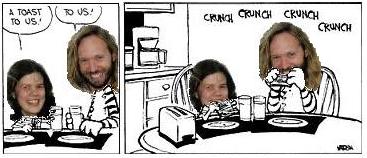Heather and I had a great Easter celebration back up in Evanston. That may be the last time we are there for quite a while, so I'm glad it was so good.
The overwheming enthusiasm of the celebrations, though, made me stop and think. And I was reminded of a journal entry from over five years ago. I think it still raises some interesting points...
January 3, 2001
Great joy does not gather the rosebuds while it may;
its eyes are fixed on the immortal rose which Dante saw.
As I've thought about these lines [by G.K. Chesterton], I've become more conscious of the true nature of joy. It has the nature of goodness, as a sharing of God's own nature. Thus true joy springs from an eternal source.
I think this important truth is obscured in many of our "joyful" celebrations. A celebration or holiday should be the
result of some good in our lives, the
expression of a joy that springs (hopefully) from some very deep well. But often the holiday or celebration becomes for us the
cause for rejoicing. We anticipate and cling to the celebration, the holiday becomes exceedingly important, because it is a precious moment of happiness in a life that seems otherwise depressing. At least that's how it looks, especially during the holiday season. This season is seen as a crucial morale-booster, and when it's brief festivities are over, people are left in a funk. If there was truly something to be joyful about (besides the party itself), then the celebration would be a bonus, a brief expression of a joy that continues long after the streamers are swept away. Then celebration could be the enjoyable emotional release it's supposed to be. It could be the happy accessory to joy, because it doesn't have to be its source. Like a wedding reception: the newlyweds leave the party early, anticipating the lasting joy of a life together. Or like an ancient harvest festival: the celebration could be light-hearted, because the real joy was in the rich harvest that would sustain the community throughout the winter. Real joy does not need to grasp at brief pleasures "for their own sake," like a parched man straining for a drop of water. Because real joy has a real source, even an eternal source.
Chesterton makes another interesting comment about joy at the end of his book "Orthodoxy." He writes, "Joy... is the gigantic secret of the Christian." And he emphasizes both 'gigantic' and 'secret,' even connecting the two in the life of Jesus:
The tremendous figure which fills the Gospels towers in this respect, as in every other, above all the thinkers who ever thought themselves tall. His pathos was natural, almost casual. The Stoics, ancient and modern, were proud of concealing their tears. He never concealed His tears; He showed them plainly on His open face at any daily sight, such as the far sight of His native city. Yet He concealed something. Solemn supermen and imperial diplomatists are proud of restraining their anger. He never restrained His anger. He flung furniture down the front steps of the Temple, and asked men how they expected to escape the damnation of Hell. Yet He restrained something. I say it with reverence; there was in that shattering personality a thread that must be called shyness. There was something that He hid from all men when He went up a mountain to pray. There was something that He covered constantly by abrupt silence or impetuous isolation. There was some one thing that was too great for God to show us when He walked upon our earth; and I have sometimes fancied that it was His mirth.
Jesus himself spoke of his own joy, and commended it to his disciples: "These things I have spoken to you, that my joy may be in you, and that your joy may be full."(Jn 15.11) But it does seem that his joy was somehow restrained or hidden. That's odd.
In movies, Jesus has often been characterized as stoic or solemn, but as Chesterton points out, that's a characterization of our own worldly ideals, not Jesus. Just as the recently popular image of a "laughing Jesus" is a characterization of our own ideal. Obviously, our ideals change. But Jesus did not conform to our ideals; he didn't try to impress us by hiding his grief or his anger, or by showing off his joy. All of these have been selling points for philosophers and religious leaders throughout history, and we continue to see them today. But Jesus demonstrated a grief and an anger that didn't need to be hidden, and a joy that didn't need to be paraded.
That brings me back to the true nature of joy. Real joy doesn't necessarily need a celebration, it doesn't need to draw attention to itself, just as true grief doesn't need to be ashamed of itself and righteous anger doesn't need to suppress itself. But, as Chesterton notes, expressions of joy are noticeably absent in the Gospel descriptions of Jesus' life, making it seem like he was
hiding his joy. Why? I like the suggestion that Jesus' joy was something primarily between him and his Father, best expressed in solitary prayer. And I also can believe that his joy was somehow too great to be publicly displayed. I can imagine a divine joy that might not be fitting for expression among sinful people. Or maybe Jesus wanted to avoid a serious misunderstanding; because the way to happiness is also the way of the cross. I have a feeling all these are hints about the truth. But I firmly believe that Jesus knew real joy, eternal joy, and that he
is the eternal source of joy for us. Also, I believe the more real our joy is, the more it will look like his.
 It's warm enough now to start doing Tai Chi outside again. Feels good to be back at it. The other day, Jorj and Miranda were out in the back yard doing it with me, a little community exercise.
It's warm enough now to start doing Tai Chi outside again. Feels good to be back at it. The other day, Jorj and Miranda were out in the back yard doing it with me, a little community exercise.








 subscribe
subscribe